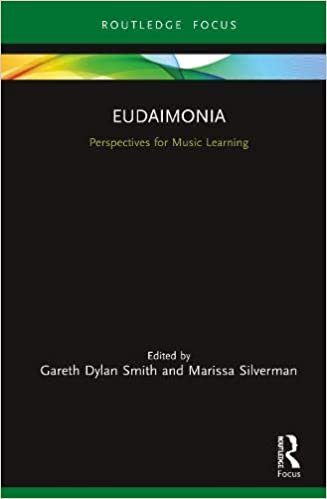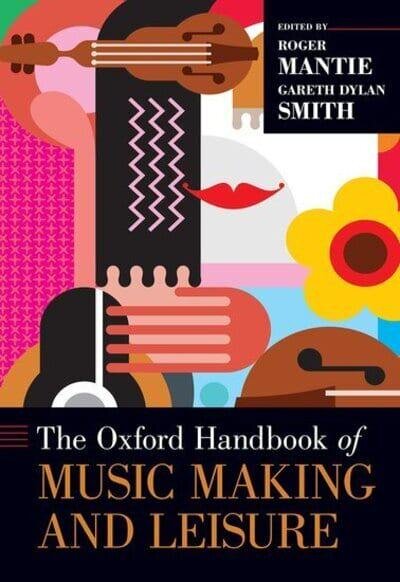Browse all my books – solo-authored, co-authored, edited – on my Amazon author page. Also, scroll down…
Academic Titles
Eudaimonia: Perspectives for Music Learning
Eudaimonia: Perspectives for Music Learning asserts the fertile applications of eudaimonia—an Aristotelian concept of human flourishing intended to explain the nature of a life well lived—for work in music learning and teaching in the 21st century. Drawing insights from within and beyond the field of music education, contributors reflect on what the "good life" means in music, highlighting issues at the core of the human experience and the heart of schooling and other educational settings. This pursuit of personal fulfillment through active engagement is considered in relation to music education as well as broader social, political, spiritual, psychological, and environmental contexts. Especially pertinent in today’s complicated and contradictory world, Eudaimonia: Perspectives for Music Learning is a concise compendium on this oft-overlooked concept, providing musicians with an understanding of an ethically-guided and socially-meaningful music-learning paradigm.
The Bloomsbury Handbook of Popular Music Education: Perspectives and Practices
The Bloomsbury Handbook of Popular Music Education draws together current thinking and practice on popular music education from empirical, ethnographic, sociological and philosophical perspectives. Through a series of unique chapters from authors working at the forefront of music education, this book explores the ways in which an international group of music educators each approach popular music education. Chapters discuss pedagogies from across the spectrum of formal to informal learning, including “outside” and “other” perspectives that provide insight into the myriad ways in which popular music education is developed and implemented.
The Music Learning Profiles Project : Let’s Take this Outside
The Music Learning Profiles Project: Let’s Take This Outside uses ethnographic techniques and modified case studies to profile musicians active in a wide range of musical contexts not typically found in traditional music education settings. The book illuminates diverse music learning practices in order to impact music education in classrooms. It goes on to describe the Music Learning Profiles Project, a group of scholars dedicated to developing techniques to explore music learning, which they call "flash study analysis." Twenty musicians were interviewed, invited to talk about what they do, how they learned to do it, and prompted to identify key learning experiences, discuss their involvement in formal learning environments, and predict how they see musicking practices passing to a future generation. The Music Learning Profiles Project offers a nuanced understanding of the myriad approaches to music learning that have emerged in the early part of the twenty-first century.
Punk Pedagogies: Music, Culture and Learning
Punk Pedagogies: Music, Culture and Learning brings together a collection of international authors to explore the possibilities, practices and implications that emerge from the union of punk and pedagogy. The punk ethos—a notoriously evasive and multifaceted beast—offers unique applications in music education and beyond, and this volume presents a breadth of interdisciplinary perspectives to challenge current thinking on how, why and where the subculture influences teaching and learning. As (punk) educators and artists, contributing authors grapple with punk’s historicity, its pervasiveness, its (dis)functionality and its messiness, making Punk Pedagogies relevant and motivating to both instructors and students with proven pedagogical practices.
The Routledge Research Companion to Popular Music Education
Popular music is a growing presence in education, formal and otherwise, from primary school to postgraduate study. Programmes, courses and modules in popular music studies, popular music performance, songwriting and areas of music technology are becoming commonplace across higher education. Additionally, specialist pop/rock/jazz graded exam syllabi, such as RockSchool and Trinity Rock and Pop, have emerged in recent years, meaning that it is now possible for school leavers in some countries to meet university entry requirements having studied only popular music. In the context of teacher education, classroom teachers and music-specialists alike are becoming increasingly empowered to introduce popular music into their classrooms. At present, research in Popular Music Education lies at the fringes of the fields of music education, ethnomusicology, community music, cultural studies and popular music studies. The Routledge Research Companion to Popular Music Education is the first book-length publication that brings together a diverse range of scholarship in this emerging field. Perspectives include the historical, sociological, pedagogical, musicological, axiological, reflexive, critical, philosophical and ideological.
Sociology for Music Teachers: practical Applications
Sociology for Music Teachers: Practical Applications, Second Edition, outlines the basic concepts relevant to understanding music teaching and learning from a sociological perspective. It demonstrates the relationship of music to education, schooling and society, and examines the consequences for making instructional choices in teaching methods and repertoire selection. The authors look at major theories, and concepts relevant to music education, texts in the sociology of music, and thoughts of selected ethnomusicologists and sociologists. The new edition takes a more global approach than was the case in the first edition and includes the application of sociological theory to contexts beyond the classroom.
The Oxford Handbook of Music Making and Leisure
Music has been a vital part of leisure activity across time and cultures. Contemporary commodification, commercialization, and consumerism, however, have created a chasm between conceptualizations of music making and numerous realities in our world. From a broad range of perspectives and approaches, this handbook explores avocational involvement with music as an integral part of the human condition. The chapters in The Oxford Handbook of Music Making and Leisure present myriad ways for reconsidering and refocusing attention back on the rich, exciting, and emotionally charged ways in which people of all ages make time for making music. The contexts discussed are broadly Western, including an eclectic variety of voices from scholars across fields and disciplines, framing complex and multifaceted phenomena that may be helpfully, enlighteningly, and perhaps provocatively framed as music making and leisure. This volume may be viewed as an attempt to reclaim music making and leisure as a serious concern for, amongst others, policy makers, scholars, and educators who perhaps risk eliding some or even most of the ways in which music - a vital part of human existence - is integrated into the everyday lives of people. As such, this handbook looks beyond the obvious, asking readers to consider anew, "What might we see when we think of music making as leisure?"
I Drum, Therefore I Am: Being and Becoming a Drummer
Despite their central role in many forms of music-making, drummers have been largely neglected in the scholarly literature on music and education. But kit drummers are increasingly difficult to ignore. While exponents of the drum kit are frequently mocked in popular culture, they are also widely acknowledged to be central to the musical success and aesthetic appeal of any musical ensemble in which they are found. Drummers are also making their presence felt in music education, with increasing opportunities to learn their craft in formal contexts. Drummers learn in multi-modal ways, usually with a keen awareness of exemplars of their art and craft. The world of kit drumming is highly masculine, which presents opportunities and challenges to drummers of both sexes. Smith proposes a new model of the 'Snowball Self', which incorporates the constructs of identity realization, learning realization, meta-identities and contextual identities. Kit drummers' identities, practices and learning are found to be intertwined, as drummers exist in a web of interdependence. Drummers drum; therefore they are, they do, and they learn - in a rich tapestry of means and contexts.
Non-Academic Titles
This book is aimed at intermediate to more advanced drummers. Written by a seasoned professional drummer and drum educator from London, England, Sound Advice for Drummers provides tips and provocations about practising, performing, rehearsing, recording and creating music from behind the drums. It is an essential read for aspiring professional drummers.
The illustrated limericks herein are the fruits of a fleeting duet performed via email by a visionary visual artist and a shackled and humbled middle-aged poet attempting to atone for transgressions of complicity in bullshittery, and to mock at the over-zealous middle management assholes who made him do it.











